De Franse schrijver en journalist Patrick Besson werd geboren op 1 juni 1956 in Montreuil. Zie ook mijn blog van 1 juni 2009 en alle tags voor Patrick Besson op dit blog.
Uit: Puta Madre
« Qu’aurait dit Virginie contre la chambre ? Il n’avait pas envie d’en changer. Elle l’aurait peut-être fait. Qu’est-ce qui lui aurait déplu dans celle-là ? L’étage peu élevé ? Les lits jumeaux ? On devrait les appeler des lits mariés car ce sont les mariés qui dorment dedans, pas les jumeaux. Il avait séjourné dans beaucoup d’hôtels et ne se souvenait pas d’y avoir jamais croisé un seul couple de jumeaux.
Il hésita entre appeler Virginie, lui écrire ou lui envoyer une photo. Il lui dirait : « C’est triste de voyager sans toi. » Non, elle prendrait la phrase comme une provocation. Ne venait-il pas, au cours d’un déplacement professionnel dans le Limousin, de la tromper avec une strip-teaseuse ? Il vanterait plutôt le charme de l’établissement, de ses trois piscines, de la plage immense. Lui écrirait-il : « Bien arrivé sans toi au paradis » ou « Bien arrivé sans toi en enfer » ? Les deux phrases étaient vraies. Pour la photographie : la chambre ou la vue ? Il se décida pour la vue mais ne la prit pas car il eut un message de la chaîne. On venait de vendre La Mort vagabonde en Allemagne. La Mort vagabonde était la cause de tout. S’il n’avait pas reçu le prix Léo-Malet du meilleur scénario de téléfilm policier au festival de Limoges, il n’aurait pas couché avec la strip-teaseuse, du coup Virginie n’aurait pas eu l’occasion de se fâcher contre lui et n’aurait pas refusé de l’accompagner à Cancún pour fêter leur troisième anniversaire de pacs, comme c’était prévu depuis des mois. Il laissa 20 pesos à l’employé qui avait porté son bagage pourtant léger.
– Muchas gracias, señor.
Les vieux Français, dans les pays hispaniques, s’entendent à tout moment rappeler leur état de senior. Mais lui, il n’était pas vieux. Quarante et un ans le 13 octobre suivant. Ce qui ne l’empêchait pas d’être chauve. Il y a beaucoup de chauves, en France, dans les milieux du cinéma et de la télévision. Il se demandait si c’était pareil dans les autres pays.”

Patrick Besson (Montreuil, 1 juni 1956)
De Engelse dichter en schrijver John Edward Masefield werd geboren op 1 juni 1878 in Ledbury, in Herefordshire. Zie ook mijn blog van 1 juni 2009 en eveneens alle tags voor John Masefield op dit blog.
C.L.M.
In the dark womb where I began
My mother’s life made me a man.
Through all the months of human birth
Her beauty fed my common earth.
I cannot see, nor breathe, nor stir,
But through the death of some of her.
Down in the darkness of the grave
She cannot see the life she gave.
For all her love, she cannot tell
Whether I use it ill or well,
Nor knock at dusty doors to find
Her beauty dusty in the mind.
If the grave’s gates could be undone,
She would not know her little son,
I am so grown. If we should meet
She would pass by me in the street,
Unless my soul’s face let her see
My sense of what she did for me.
What have I done to keep in mind
My debt to her and womankind?
What woman’s happier life repays
Her for those months of wretched days?
For all my mouthless body leeched
Ere Birth’s releasing hell was reached?
What have I done, or tried, or said
In thanks to that dear woman dead?
Men triumph over women still,
Men trample women’s rights at will,
And man’s lust roves the world untamed.
* * * *
O grave, keep shut lest I be shamed.
*C.L.M. = Caroline Louisa Masefield, de moeder van John
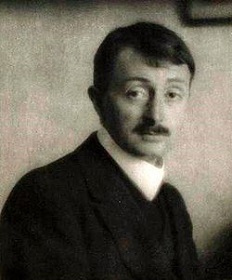
John Edward Masefield (1 juni 1878 – 12 mei 1967)
De Oostenrijkse schrijver Ferdinand Raimund werd geboren op 1 juni 1790 in Wenen. Zie ook mijn blog van 1 juni 2009 en eveneens alle tags voor Ferdinand Raimund op dit blog.
Hobellied
Da streiten sich die Leut´ herum
wohl um den Wert des Glücks;
der eine heißt den andren dumm;
am End´weiß keiner nix.
Da ist der allerärmste Mann
dem andern viel zu reich!
Das Schicksal setzt den Hobel an
und hobelt alles gleich.
Die Jugend will halt stets mit G´walt
in allem glücklich sein;
doch wird man nur a bisserl alt,
dann find´t man sich schon drein.
Oft zankt mein Weib mit mir, oh Graus!
Das bringt mich nicht in Wut.
Da klopf´ich meinen Hobel aus
und denk: Du brummst mir gut!
Zeigt sich der Tod einst, mit Verlaub,
und zupft mich: Brüderl, kumm!
Da stell´ ich mich im Anfang taub
und schau mich gar net um.
Doch sagt er: Lieber Valentin,
mach´keine Umständ´ geh!
Da leg´ ich meinen Hobel hin
und sag´ der Welt Ade!
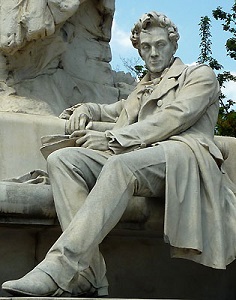
Ferdinand Raimund (1 juni 1790 – 5 september 1836)
Raimund monument in Wenen
De Duitse schrijver, essayist, journalist, biograaf en uitgever Peter de Mendelssohn werd op 1 juni 1908 in München geboren. Zie ook mijn blog van 1 juni 2009 en eveneens alle tags voor Peter de Mendelssohn op dit blog.
Uit: Das zweite Leben
“Zwei deutsche Großbanken brechen in der Krise zusammen!
So lautete die Schlagzeile der Zeitung. Zwei der deutschen Großbanken hatten schließen müssen, über Nacht, ohne jede Warnung. Sie hatten ihren Verpflichtungen nicht mehr nachkommen können und waren vom Staat übernommen worden. Eine dritte hatte der Staat gezwungen, das Geschäft einzustellen, ehe der Krach unvermeidlich wurde.
‘L’ Allemagne déclare, qu’elle n’a plus le sou.’
So stand in der Zeitung, Deutschland erklärte, es besitze keinen Heller mehr. Das reich hatte jährlich rund zwei Milliarden an Reparationen und ungefähr den gleichen Betrag an Kriegsschulden aufgebracht, viele Jahre hindurch. Nun ging es nicht mehr.
Viele Tausende hatten anscheinend ihre kleinen Ersparnisse verloren; es schien zweifelhaft, ob sie schadlos gehalten werden konnten. Die auswärtigen Anleihen an Deutschland waren angeblich schwer gefährdet. er Reichsbankpräsident Dr. Luther kabelte an den Präsidenten der Vereinigten Staaten, Hoover, und bat ihn um ein einjähriges Moratorium für alle deutschen Anleihen und Schulden. Hoover gewährte das Moratorium. Als dies erreicht war, flog Dr. Luther nach Paris und London. In Paris und London nahm man ihn nicht gerade begeistert auf. Er hielt sich in keiner der beiden Städte lange auf, sonder flog zurück und brachte eine Regierungsverordnung heraus, des Inhalts, daß von nun an niemand, der sich in Deutschland aufhielt, monatlich mehr als einen bestimmten Betrag ins Ausland senden durfte. Es waren pro Kopf zweihundert Mark.”
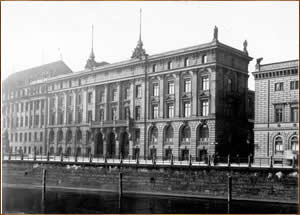
Peter de Mendelssohn (1 juni 1908 – 10 augustus 1982)
Berlijn, hoofdkantoor van de „Darmstädter und Nationalbank“ op de Schinkelplatz die in 1931 moest sluiten.
Onafhankelijk van geboortedata:
De Nederlandse dichter Dennis Gaens werd geboren in Susteren in 1982. Zie ook alle tags voor Dennis Gaens op dit blog.
Sneakers
Er zijn tijden dat we ons willen vastketenen
aan deze plek tot we weer in onze moedertaal
denken, al komt dat zelden voor. Meestal worden
we al richting straat wakker, onze kleren langs
het bed geplooid. De deur nog open van vannacht.
Onze sneakers zijn gemaakt voor korte afstanden
en toch trappen we er de stad mee plat, lopen we
om, om tegen een blikje te schoppen. Vooral bij
halve liters; altijd richting om het even welk
object. Onze ogen een tel vol opzet.
Er zijn dagen dat we een vaderfiguur in iedereen
zien en dan weer alleen in hem en ondanks alles.
Er zijn hier genoeg verhalen en op elke hoek
kun je eten. Onze voeten veren vol vertrouwen.
Wij zijn een soort pact, ik en dit meervoud en
ons lopen is alles wat we hebben.
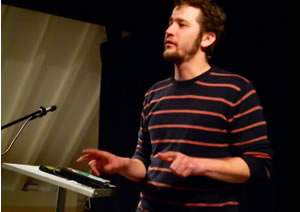
Dennis Gaens (Susteren, 1982)
De Britse schrijver Rhidian Brook werd geboren in 1964 in Tenby. Zie ook alle tags voor Rhidian Brook op dit blog.
Uit: The Aftermath
“We’ve found a house for you, sir.”
Captain Wilkins stubbed out his cigarette and placed his yellowed finger on the map of Hamburg that was pinned to the wall behind his desk. He traced a line west from the pinhead marking their temporary headquarters, away from the bombed-out districts of Hammerbrook and St. Georg, over St. Pauli and Altona, towards the old fishing suburb of Blankenese, where the Elbe veered up and debouched into the North Sea. The map—pulled from a pre-war German guidebook—failed to show that these conurbations were now a phantom city comprised only of ash and rubble.
“It’s a bloody great palace by the river. Here.” Wilkins’s finger circled the crook at the end of the Elbchaussee, the road running parallel to the great river. “I think it’ll be to your taste, sir.”
The word belonged to another world: a world of surplus and civil comfort. In the last few months, Lewis’s tastes had narrowed to a simple checklist of immediate and basic needs: 2,500 calories a day, tobacco, warmth. “A bloody great palace by the river” suddenly seemed to him like the demand of a frivolous king.
“Sir?”
Lewis had “gone off ” again; off into that unruly parliament inside his head, a place where, more and more, he found himself in hot debate with colleagues.
“Isn’t there someone living in it already?”
Wilkins wasn’t sure how to respond. His CO was a man of excel- lent repute with an impeccable war record, but he seemed to have these quirks, a way of seeing things differently. The young captain resorted to reciting what he had read in the manual: “These people have little moral compass, sir. They are a danger to us and to them- selves. They need to know who is in charge. They need leadership. A firm but fair hand.”
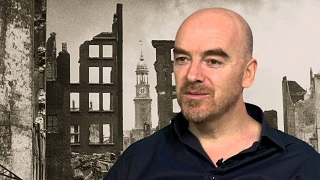
Rhidian Brook (Tenby, 1964)
